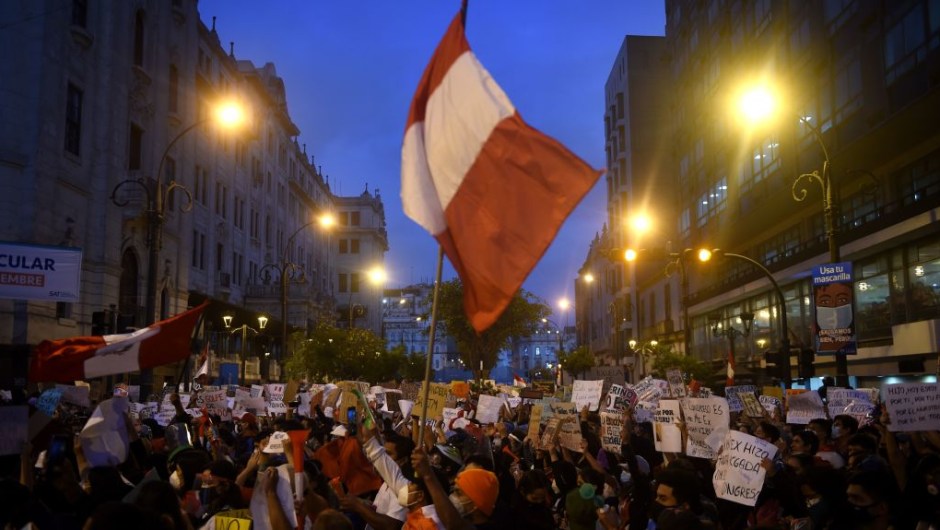Demonstrators protest in Lima on November 14, 2020 against the removal of Martín Vizcarra.
(Credit: ERNESTO BENAVIDES / AFP via Getty Images)
Editor's Note:
Roberto Izurieta is Director of Latin American Projects at George Washington University.
He has worked in political campaigns in several Latin American countries and Spain, and was an advisor to Presidents Alejandro Toledo, of Peru;
Vicente Fox, from Mexico, and Álvaro Colom, from Guatemala.
Izurieta is also a contributor to CNN en Español.
The opinions expressed in this column are solely those of the author. See more opinions at cnne.com/opinion
(CNN Spanish) -
The thinker Claude Lefort warned that democracy "is an empty place."
Peru is showing it;
as it also shows that democracy is an idea that is built with permanent actions over time.
Peru was an example of economic prosperity in the region (at least in the formal macroeconomic figures) and showed signs of great political stability.
Peru builds that political and economic stability after the devastating years lived as a consequence of the economic populism of the first government of Alan García, in the 90s. To this we had to add - and we must never forget - the fight against terrorism of Sendero Bright.
It is Alberto Fujimori who, firmly, but very controversially, and later sentenced in 2009 to 25 years in prison for crimes against humanity, ends up giving way to that stability of recent years.
MIRA: José Ugaz: Sagasti could offer Peru a peaceful political transition
advertising
In Peru, the economic model of free enterprise was not questioned during those years.
The military returned to their barracks to do their job and politics became independent, for the most part, and in its own way professionalized, with its imperfections.
Imperfections such as those seen in the rest of the region, because they did not define or formalize how the policy would be financed.
As if politics were voluntary work.
And in my experience, Peru experienced a challenge that is also very common in our region: marginalization.
The differences between Lima and the interior of the country allowed Alberto Fujimori to surprise Mario Vargas Llosa with his triumph (and he continued to surprise them for a decade).
If the economic, intellectual, formal and opinion elites -especially those from Lima- did not understand this poor dynamic with the marginalized majorities (especially from the Andes and other parts of the country), at least they stepped aside and allowed to govern to emerging politicians.
The governments of Alejandro Toledo, Alan García and Ollanta Humala surprised by their political stability.
(It should be noted that the three leaders have been investigated for alleged corruption in the context of the Odebrecht bribes. All three denied the accusations).
MIRA: The challenges of the next interim president of Peru
In the second electoral round between Pedro Pablo Kuczynski (PPK) and Keiko Fujimori there is a breakdown of that fragile balance with the business and opinion sectors of Lima.
In that second round, Verónika Mendoza, the leftist candidate, had been left behind, and a large part of the business sectors feel relieved and decide to return to politics and take sides for one or the other candidate, breaking that balance that, in my opinion, it had served very well.
PPK leaves the presidency, not only because of the accusations - which he has denied - of having lied to the country about his relationship with Odebrecht.
Also because, in my opinion, it did not have the same level of political management that a country of the complexity and marginalization of Peru needed.
And we must understand that politics and democracy must serve to open spaces of power, in a constructive order, where we increasingly have more and better democracy, not to create instability and violence.
Then a second vice president appears, Martín Vizcarra, who nobody knew about and initially surprises with his broad support in opinion polls.
It was obvious, there was a kind of relief and need for fresh airs and change.
The inexperience of another level, of going beyond his region -Moquegua-, the deep ignorance of how a democracy works or should function, or perhaps naivety (some call it nobility) leads him to ask for the dissolution of Congress and call for elections, just when it was most popular.
I opposed such a political maneuver because we had just seen those siren songs in the Venezuela of Hugo Chávez, the Bolivia of Evo Morales and the Ecuador of Rafael Correa.
Each one of them claimed legal bases to do so and that was left for discussion by the constitutionalists of each country.
The difference between them and Vizcarra is that they drained the power to fill it themselves immediately.
Peru only fell into a political vacuum.
When politics leaps into the void, anyone fills it: as Janine Áñez filled it in the nights of confusion in Bolivia and how Peru's new congressmen filled it in this year's election;
that besides being new (the majority), some defend unpresentable ideas.
When you jump into the void, anything can happen.
LOOK: OPINION | The Brazilian right no longer needs Bolsonaro
What democracy seeks is to build spaces of power. Find and test your intermediaries (which are generally political parties) over time. Seek their professionalization and improvement. It seeks to eliminate its sins in time and build itself on serious, professional and honorable institutions. That is the task of the new president Francisco Sagasti to whom I wish, above all, that. All of this takes time, work and a majority of society, at least basic, to support it. Democracy takes time to build and also needs actions from its political, opinion, and social leaders. While this process begins and builds, the least we can ask is that it take place without violence.













